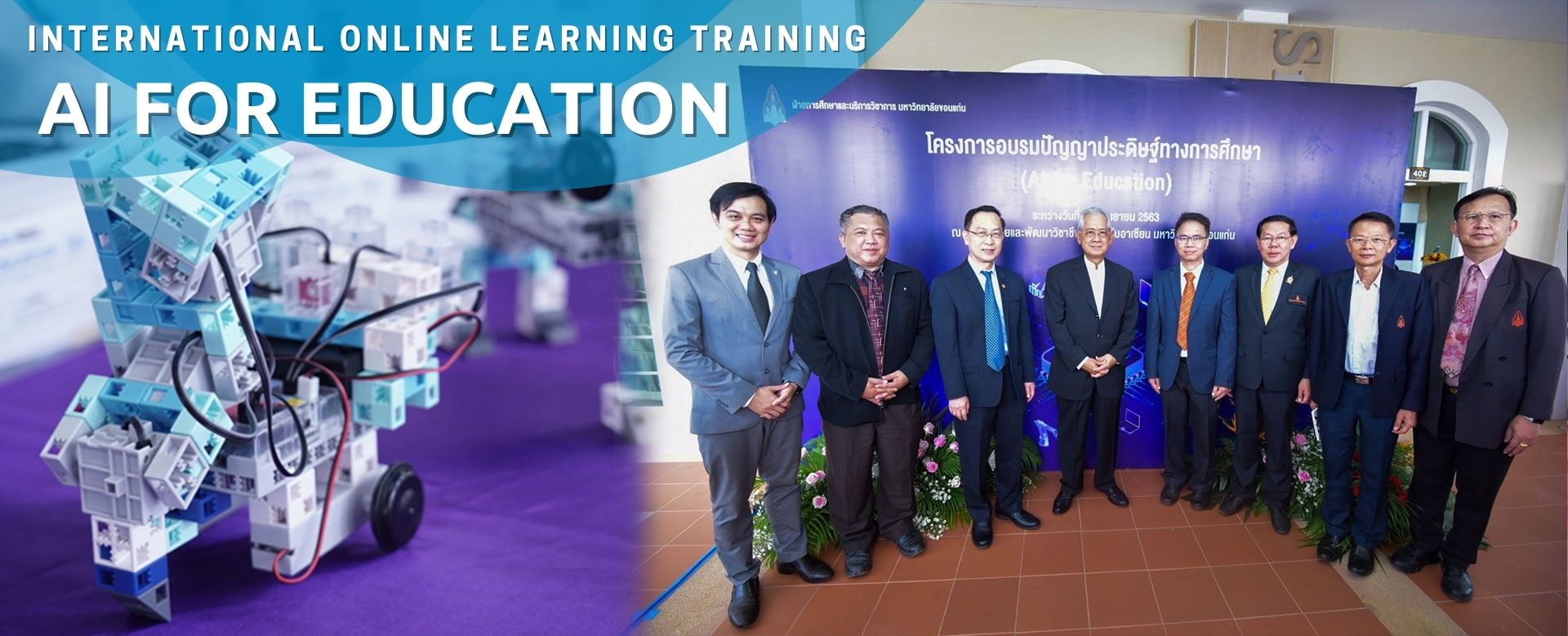


September 1, 2020, at SMART classroom, IRDTP for ASEAN Building, Khon Kaen University – Education and Academic Services Section, Khon Kaen University organized an International Online Learning Training regarding Artificial Intelligence (AI) for Education. The AI for Education training was begun with welcoming and opening speeches by three top management of Khon Kaen University, namely Chairman of Khon Kaen University Council, President and Vice President of Education and Academic Services of Khon Kaen University.
As reported by H. E. Dr. Narongchai Akrasanee, Chairman of Khon Kaen University Council that more than 300 participants participated in this international online training. He further emphasized the importance of AI as human beings’ current need and its relationship with Natural Intelligence (NI). Although AI is considered lifeless, it works tremendously in our lives. According to him, human beings possess NI as revealed by the United States of America Army’s Human Intelligence Committee in 2013. Therefore, we must combine AI and NI to make up the world society’s needs, such as the development of AI and the AI industry with education.
The president of Khon Kaen University, Associate Professor Chanchai Panthongwiriyakul informed that Khon Kaen University has established an important Educational Transformation plan for university development encompassing four strategies to achieve its goal. The four strategies are focusing on lifelong learning as the mechanism. He explained that the Educational Transformation of Khon Kaen University is consistent with the world’s development approach which is not only developing the world populations’ thinking skills in the 21st century but also developing the essential thinking skills in the fourth industrial revolution, computational, and statistical thinking. As a result, the AI concept either for healthcare or education will be the basic knowledge that everyone should learn so that we can achieve our university’s educational transformation plan thus support the global trends.
The Vice President for Education and Academic Services of Khon Kaen University, Associate Professor Dr. Maitree Inprasitha indicated that his department prioritized the inauguration of AI for Education that potentially bringing the Fourth Industrial Revolution to the fore and raised interest in what the Fourth Industrial Revolution might mean for education in general. As the global economy moves towards the widespread adoption of AI solutions, the competition will grow for employees who have the scarce skills required to implement, manage, and work alongside the new technology. Developing these skills is therefore essential for any university graduates wishing to remain relevant in an increasingly automated workplace. He further clarified that Khon Kaen University has already collaborated with Japan on the APEC Human Developing Helping Group project through the promotion of the four basics of moral ethics, namely A, B, C, and D. A stands for AI, B stands for Blockchain, C stands for cloud, and D stands for big data. Frome 2009 until now, his department has continued inviting world-class experts to assist us to design courses for elementary, middle, and higher education so that our academic services can reach the 21st-century educational performance.
Three internationally well-known AI experts were invited to share their research findings on how to bring AI into future teaching. They are (i) Professor Masami Isoda from the University of Tsukuba, Japan; (ii)Professor Hee-Chan Lew from Korea National University of Education, South Korea, and (iii) Professor Roberto Araya from the University of Chile, Chile.
Professor Masami Isoda discussed mathematical thinking which includes higher-order thinking. Higher-order thinking is general terminology in Education, especially for curriculum and assessment. It makes it possible to distinguish with others such as knowledge and skills. Mathematical thinking can be specified by mathematical ideas, general ways of thinking, and values and attitudes. Mathematical thinking can be developed by learning through appropriate task sequences. Japanese textbooks have been developed and revised through lesson study to develop mathematical thinking.
Professor Hee-Chan Lew presented the topic of “Convergence Education for Smart Thinking in Rapid Society Change”. According to him, we need a new education system to transit from uniform and standardized education for the 20th-century industrialization era to selective, integrative, and custom-made education to cultivate smart thinking in the 21st-century information era. He further highlighted smart thinking in Industry 4.0 as it is a thinking skill to support cognitive skills like critical thinking, and problem-solving and soft skill like challenging adventure and networking.
Finally, Professor Roberto Araya shared some of his thought about why and how to teach AI and computational thinking in schools. Apps and Internet applications, some soft wares are useful to us, within us, predictions for us and making decisions for us. For example, in the lesson of the teacher, the computer is listening, analyzing the lessons, maybe just to use for us on what to do or maybe making the decision in the sense asking questions, the computer to certain students or group of students according to what teacher says, and the reactions of the students. Students set profound implications.
In addition to the three AI experts’ discussions, there is also an AI for Education exhibition as a platform in providing a teaching arrangement to improve learning skills in the artificial intelligence era.























